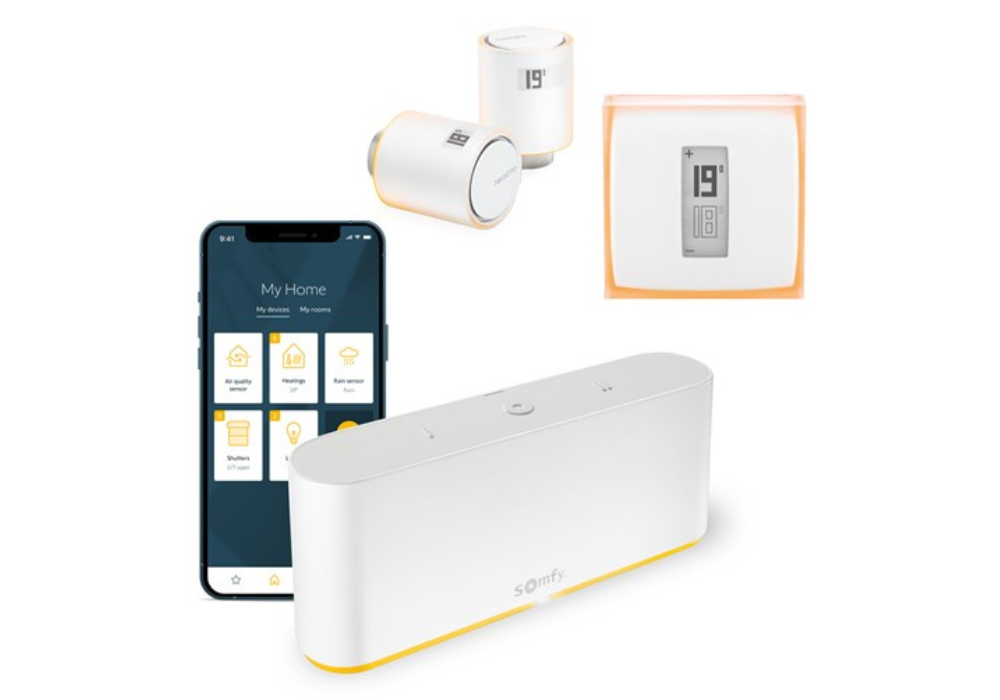
Netatmos smarte termostat og radiatortermostat er nå kompatible med Somfy TaHoma Switch

The air in your home is more polluted than the air outside: it's surprising, but it's a fact… breathing in your home means inhaling air that is at least 5 times more polluted than the atmosphere in your street! Hence the immense interest in properly ventilating and airing all rooms. But just what are the differences between the two terms?
In general, when we ventilate, we open the windows to let new air and sunshine in, and when we ventilate, we evacuate the stale air and replace it with clean air continuously. But it is not that simple.
To get to the root of the problem, it is important to know that living in a house naturally emits many impurities, harmful substances, and moisture into the indoor air. This is not a reason to stop breathing… but if you ventilate too little, you will experience headaches, irritation, allergies, and other problems.
As far as ventilation and airing of rooms are concerned, the difference between the two systems is as follows: airing is the brief (few minutes) renewals of a significant amount of air. This is done by opening the windows or even the doors wide for 10-15 minutes in the morning and evening. This is important to let fresh air into the house, get rid of indoor air pollution, and create airflow. This flow removes the "bad" air full of allergens and brings in the "good" air. Ventilation, on the other hand, is a continuous action, where the air is constantly renewed day and night, summer and winter.
This is often achieved by a mechanical system, a CMV, although ventilation can also be achieved through grilles in the wall, special windows, and doors.
Ventilation is necessary, ventilation is extremely useful. But it is also beneficial to go further in monitoring your air quality and knowing when the rooms in your home need clean air. For this, the Netatmo Smart Weather Station and the Netatmo smart Air Quality Sensor are the perfect allies: humidity level, atmosphere quality, atmospheric pressure… access your own weather measurements on your smartphone and be alerted as soon as you need to ventilate.
Proper ventilation of your home is therefore essential to avoid humidity and to remove pollutants emitted by wood, gas, or other heating systems. Most energy sources produce unwanted substances: good ventilation is the best way to get rid of them.
Controlled mechanical ventilation (CMV) is therefore a very useful piece of equipment. This ventilation system continuously renews the air inside your home. It thus contributes to an essential function: to ventilate and evacuate the stale air of your water rooms (bathroom in priority) while letting in fresh air from outside.
Ito sum up, the controlled mechanical ventilation system, more commonly known as VMC, is extremely effective in ensuring the renewal of the air in the rooms of your home. An excellent CMV protects the quality of your indoor air as well as your home and ultimately your health.
Airing is good, ventilation is way better…
As we have seen in another article, airing these same rooms daily is a habit to adopt, but it is not enough: a quality CMV will independently complement your efforts to constantly renew the air in your rooms. Goodbye to humidity and its inconveniences: fungus, marks, asthma, etc.
The sensors of your Netatmo Smart Weather Station provide you with real-time weather data that matters to you, measured right in front of your house and inside your home. Easily view your data and monitor your air quality so you don't miss a good opportunity to ventilate!
Just because there is a lot of talk about indoor air pollution and the need to ventilate as frequently as possible and to ventilate all the time does not mean that these are passing fads.
This issue, which is increasingly being singled out, is indeed new and is being closely studied by ADEME. Schools, nurseries, public buildings, and private homes are all concerned: everywhere, pollutants trapped indoors, such as VOCs (Volatile Organic Compounds), some of which are classified as carcinogenic, are found in the air. Humidity has also become the enemy to tackle… and for many reasons!
Ventilation is not a trivial matter. This is a public health issue! So, with or without VMC, we ventilate, we ventilate, we ventilate… in short, we blow wind. Without CMV, it is still possible to ventilate effectively with windows that are always open or with a system of grilles that are open to the outside. Note, however, that the goal is not to let all your heat escape to the street either!
Don't hesitate to ask a professional for quotes on the installation of a CMV system to optimise the ventilation of the rooms in your house. Don't forget to choose a craftsman, that will allow you to be eligible for public financial aid, as for insulation.
So, from dry places to water rooms, air and ventilate thoroughly. But remember to keep an eye on the weather forecast before doing so! This is the only way to avoid humidity, poor air quality, and all the consequences associated with it. Your rooms need fresh air, especially after sleeping, after cooking, when your guests are leaving, after lighting scented candles, or during DIY. Do not allow toxic elements to accumulate, rely on ventilation.